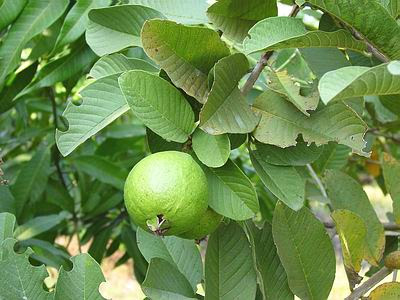Guava Health Benefits and Medicinal Properties
The guava is one of the most delicious fruits and is known botanically as Psidium gaujava, and locally by different names such as Amrud, Peru, Piyara, Koyya, Sede Pandu etc.
The nutritional properties of the Guava fruit:
The fruit is one of the richest source of vitamin C (212 mg/100 g fruit). The quantity of vitamin C increases with the maturity of fruit
The fruit contains fairly large quantities of useful minerals like phosphorus (20-30 mg/100 g fruit) and calcium ( 20-210 mg/100 g fruit ) depending on the variety
The seeds of guava fruits are very rich in an orange-yellow colored aromatic oil (14%) that contains considerable amounts of iodine
Some of varieties produce fruits rich in potassium and carotene while others lack these useful constituents.

The medicinal properties of the Guava fruit:
1. Guava leaves and bark are used traditionally as a disinfectant and antiseptic for dressing wounds and sores
2. A decoction of Guava leaves is used for relieving tooth-ache and gum boils when used for gargling
3. The flowers of Guava are used for treating bronchitis
4. The Guava fresh leaf extract (decoction) is used to treat digestive disorders like diarrhoea and vomiting
5. Application of powdered leaves is believed to have soothing effect in rheumatic pains.
6. The fruit helps reduce high blood pressure.
7. It is also considered to increase the good cholesterol.
8. The guava leaf extract is also effective in treating gastrointestinal due to the presence of quercetin and other flavonoids.
9. The bark extract protects the heart and improve its functionality.
10. It is also used to treat acne and painful menses.
11. Guava bark is used medically as an astringent and to treat diarrhea in children,
12. The flowers are used to treat bronchitis, eye sores and to cool the body.
13. The fruit is also used as a tonic and laxative, and for the treatment of bleeding gums.
14. It is used to prevent and treat scurvy.
15. Use of the plant in treating malaria also finds mention in few reports.
16. Guava leaf tea is commonly used as a medicine against gastroenteritis (dysentry) and child diarrhea.
The nutritional properties of the Guava fruit:
The fruit is one of the richest source of vitamin C (212 mg/100 g fruit). The quantity of vitamin C increases with the maturity of fruit
The fruit contains fairly large quantities of useful minerals like phosphorus (20-30 mg/100 g fruit) and calcium ( 20-210 mg/100 g fruit ) depending on the variety
The seeds of guava fruits are very rich in an orange-yellow colored aromatic oil (14%) that contains considerable amounts of iodine
Some of varieties produce fruits rich in potassium and carotene while others lack these useful constituents.

The medicinal properties of the Guava fruit:
1. Guava leaves and bark are used traditionally as a disinfectant and antiseptic for dressing wounds and sores
2. A decoction of Guava leaves is used for relieving tooth-ache and gum boils when used for gargling
3. The flowers of Guava are used for treating bronchitis
4. The Guava fresh leaf extract (decoction) is used to treat digestive disorders like diarrhoea and vomiting
5. Application of powdered leaves is believed to have soothing effect in rheumatic pains.
6. The fruit helps reduce high blood pressure.
7. It is also considered to increase the good cholesterol.
8. The guava leaf extract is also effective in treating gastrointestinal due to the presence of quercetin and other flavonoids.
9. The bark extract protects the heart and improve its functionality.
10. It is also used to treat acne and painful menses.
11. Guava bark is used medically as an astringent and to treat diarrhea in children,
12. The flowers are used to treat bronchitis, eye sores and to cool the body.
13. The fruit is also used as a tonic and laxative, and for the treatment of bleeding gums.
14. It is used to prevent and treat scurvy.
15. Use of the plant in treating malaria also finds mention in few reports.
16. Guava leaf tea is commonly used as a medicine against gastroenteritis (dysentry) and child diarrhea.








Comments
Post a Comment